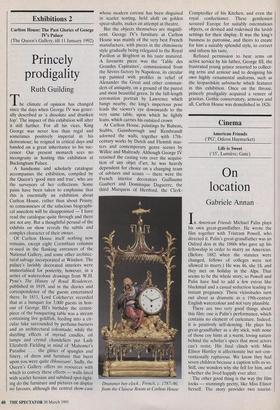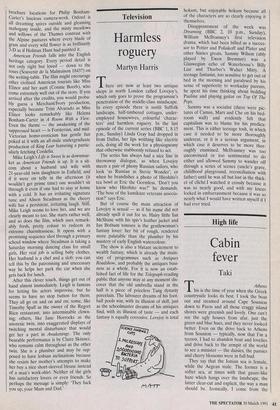Cinema
American Friends (PG', Odeon Haymarket) Life is Sweet (`15', Lumiere; Gate)
On location
Gabriele Annan
In American Friends Michael Palin plays his own great-grandfather. He wrote the film together with Tristram Powell, who directed it. Palin's great-grandfather was an Oxford don in the 1860s who gave up his fellowship in order to marry an American. (Before 1882 when the statutes were changed, fellows of colleges were not allowed to marry.) He was 46, she 18, and they met on holiday in the Alps. That seems to be the whole story, so Powell and Palin have had to add a few extras like blackmail and a casual seduction leading to instant pregnancy. These vicissitudes turn out about as dramatic as a 19th-century English watercolour and not very plausible.
There are two very good things about this film: one is Palin's performance, which contains no element of caricature. Indeed, it is positively self-denying. He plays his great-grandfather as a dry stick, with none of those coy hints at a warm, loving nature behind the scholar's specs that most actors can't resist. His final clinch with Miss Elinor Hartley is affectionate but not con- ventionally rapturous. We know they had seven children because a caption tells us so. Still, one wonders why she fell for him, and whether she lived happily ever after.
The other good thing is the way the film looks — stunningly pretty, like Miss Elinor herself. The story provides two tourist- brochure locations for Philip Bonham- Carter's luscious camera-work. Oxford is all dreaming spires outside and gleaming mahogany inside, and the misty meadows and willows of the Thames contrast with the Alpine pastures where every blade of grass and every wild flower is as brilliantly 3-D as if Holman Hunt had painted it. American Friends falls into the English heritage category. Every period detail is not only right but loved — down to the roses (Souvenir de la Malmaison 1843?) on the writing-table. The film might encourage other civilised American tourists like Miss Elinor and her aunt (Connie Booth), who come extremely well out of the story. If you arrived after the credits, you would proba- bly guess a Merchant/Ivory production, especially because Trini Alvarado as Miss Elinor looks remarkably like Helena Bonham-Carter in A Room With a View. Even the theme — the awakening of the suppressed heart — is Forsterian, and mid- Victorian homo-eroticism has gentle fun poked at it with an all-male undergraduate production of King Lear featuring a partic- ularly fetching Cordelia.
Mike Leigh's Life is Sweet is as downmar- ket as American Friends is up. It is a sit- com about a husband and wife with 21-year-old twin daughters in Enfield, and if it were on telly in the afternoon (it wouldn't get prime time) one wouldn't sit through it even if one had to stay at home with a cold. It has an irritating signature tune and Alison Steadman as the cheery wife has a persistent, irritating laugh. Still, Mike Leigh seems to love her, and we are clearly meant to too. She starts rather well, and so does the film, which uses remark- ably fresh, pretty colour to redeem its extreme charmlessness. It opens with a promising sequence shot through a primary school window where Steadman is taking a Saturday morning dancing class for small girls. Her real job is selling baby clothes. Her husband is a chef and a slob: you can tell this by the patronising and unecessary way he helps her park the car when she gets back for lunch. After this clever touch, things get out of hand almost immediately. Leigh is famous for letting his actors improvise, but he seems to have no stop button for them. They all go on and on and on; some, like Timothy Spall as the owner of the Regret Rien restaurant, into interminable clown- ing; others, like Jane Horrocks as the anorexic twin, into exaggerated displays of twitching mental disturbance that would get her a part in Awakenings. The only bearable performance is by Claire Skinner, who remains calm throughout as the other twin. She is a plumber and may be sup- posed to have lesbian inclinations because she resists her mother's attempts to make her buy a nice short-sleeved blouse instead of a man's work-shirt. Neither of the girls has satisfactory lovers or even friends. So perhaps the message is simply: 'They fuck you up, your Mum and Dad.'



















































 Previous page
Previous page